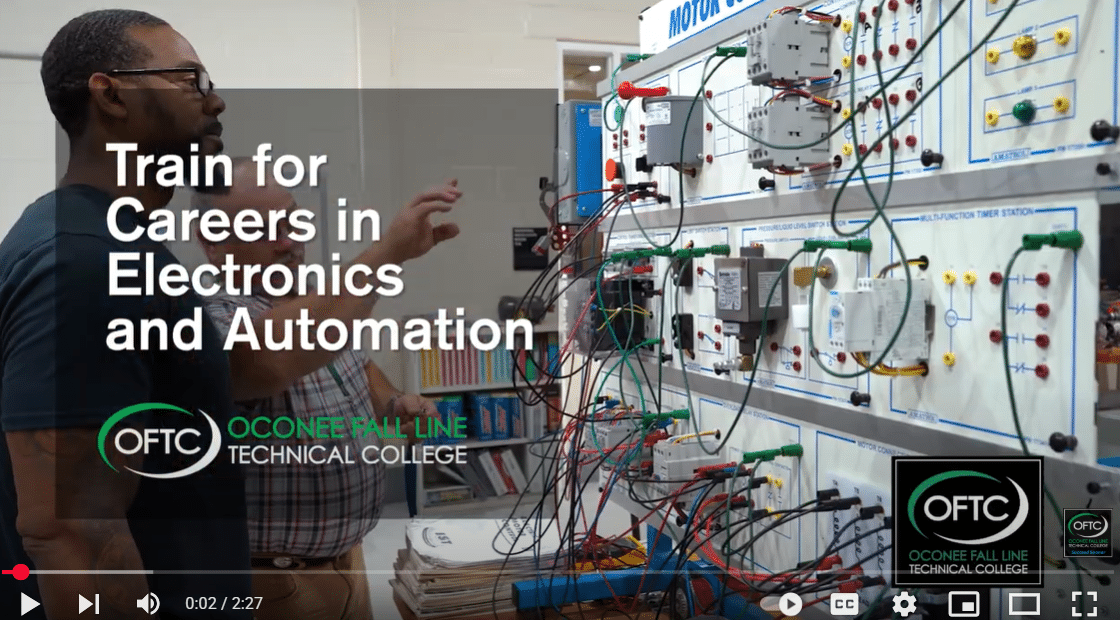Electronics Technology
settingsEssential to the technology industry and its consumers, the electronics technician career will only become more necessary as we continue to rely on more and more devices to make our lives easier.
Overview
OFTC’s Electronics Technology program prepares students for in-demand careers designing, building, and troubleshooting electronic systems. Through hands-on training, students gain the skills to work confidently with analog and digital electronics, solving real-world problems in today’s tech-driven industries.
Electronics technicians play a key role in maintaining and repairing equipment, calibrating systems, reading blueprints and schematics, and documenting technical data. Their work supports industries that rely on precision and reliability in every circuit.
Programs in Electronics Technology can be completed in as little as 1 to 5 semesters.
Programs
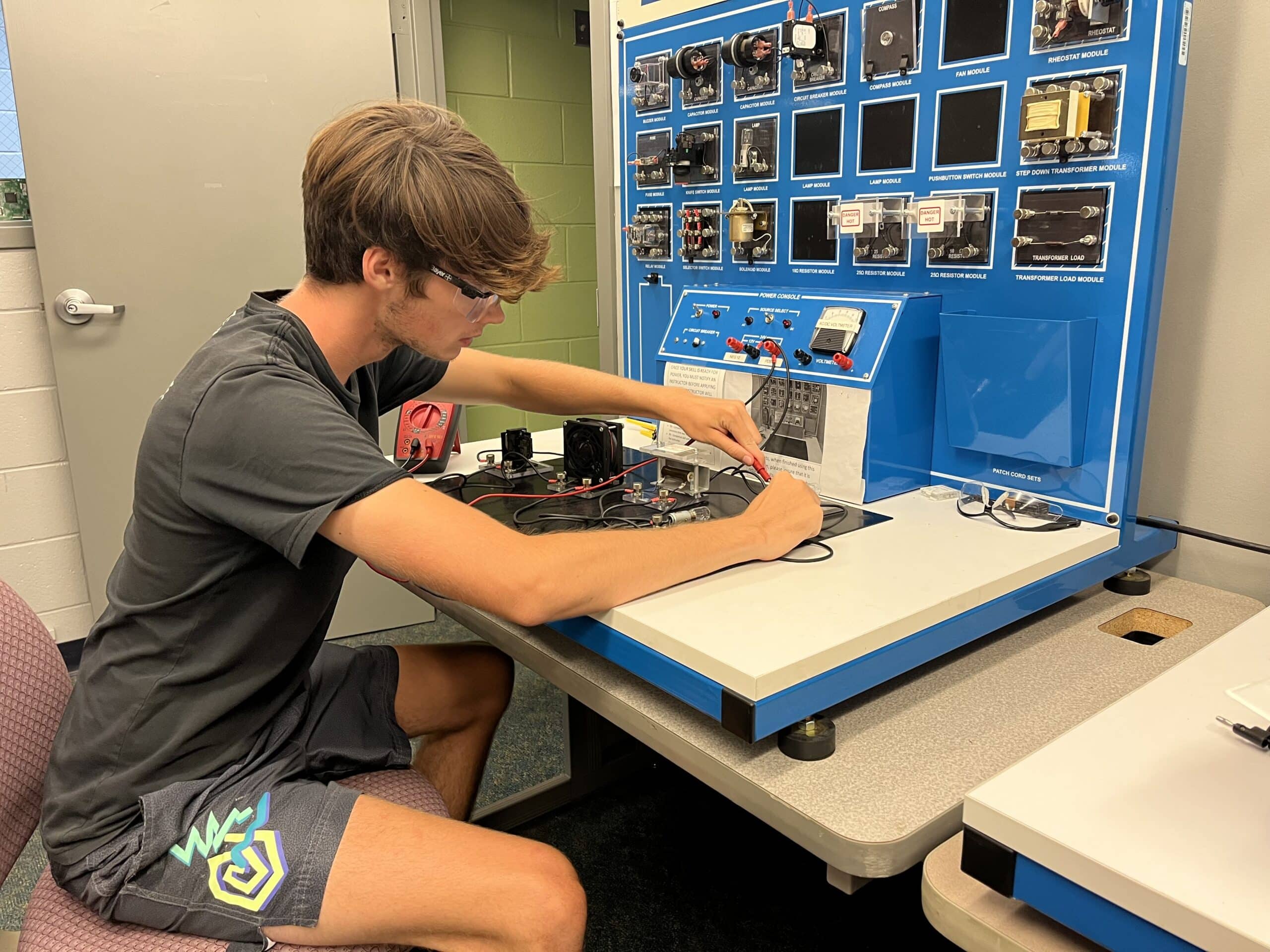
Basic Electricity Technician Technical Certificate of Credit
Electronics Technology
Certificate of Credit
1 Semester
The Basic Electrical Technician Technical Certificate of Credit provides a basic knowledge of direct current and alternating current circuits and their components.
The HOPE Career Grant is available to HOPE Grant-qualified students who enroll in select majors specifically aligned with industries in which there are more jobs available in Georgia than there are skilled workers to fill them. Learn More
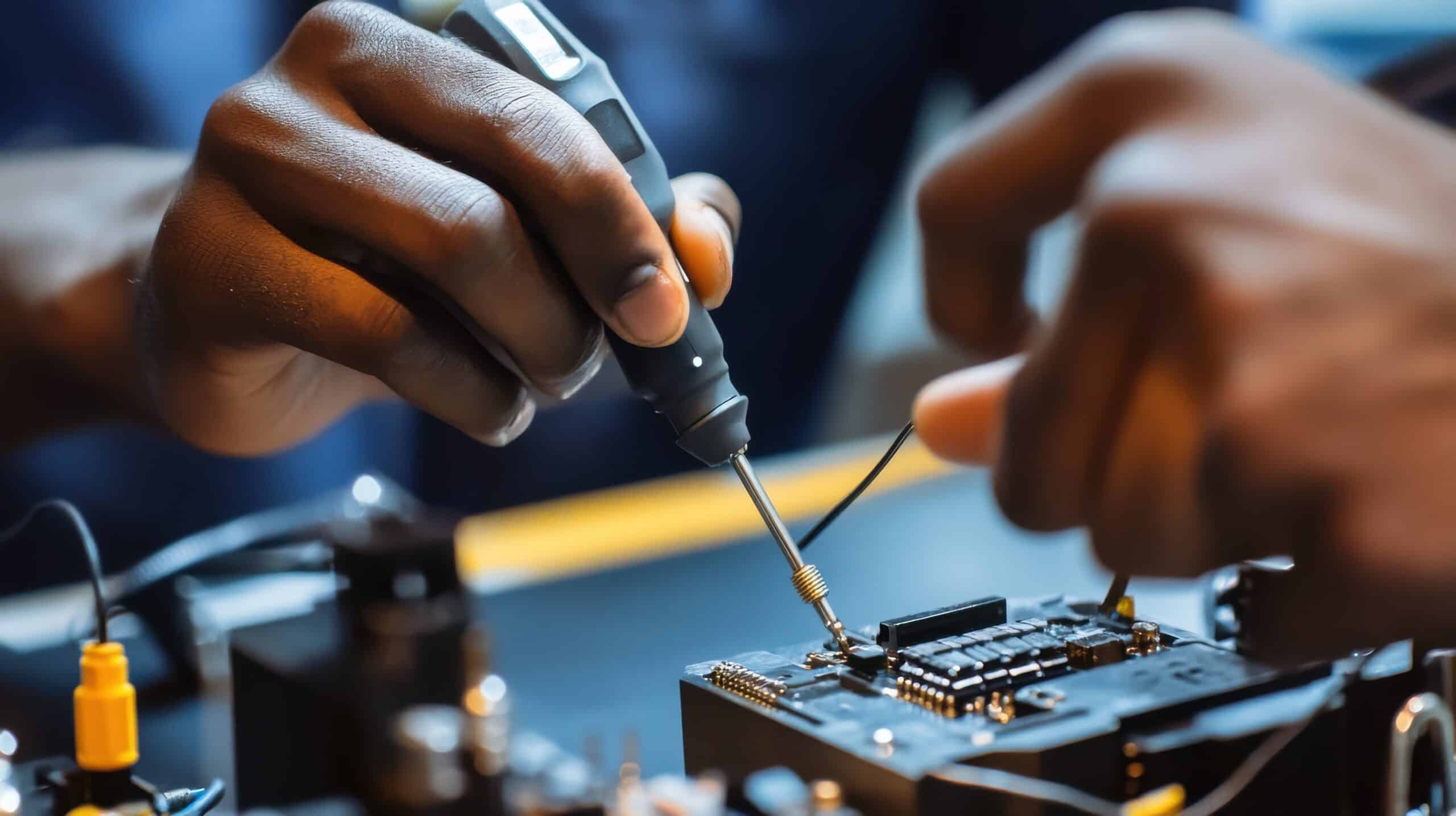
Basic Electronic Assembler Technical Certificate of Credit
Electronics Technology
Certificate of Credit
1 Semester
The Basic Electronic Assembler certificate program provides instruction to prepare students for employment in a variety of positions within the industrial production equipment maintenance field.
The HOPE Career Grant is available to HOPE Grant-qualified students who enroll in select majors specifically aligned with industries in which there are more jobs available in Georgia than there are skilled workers to fill them. Learn More
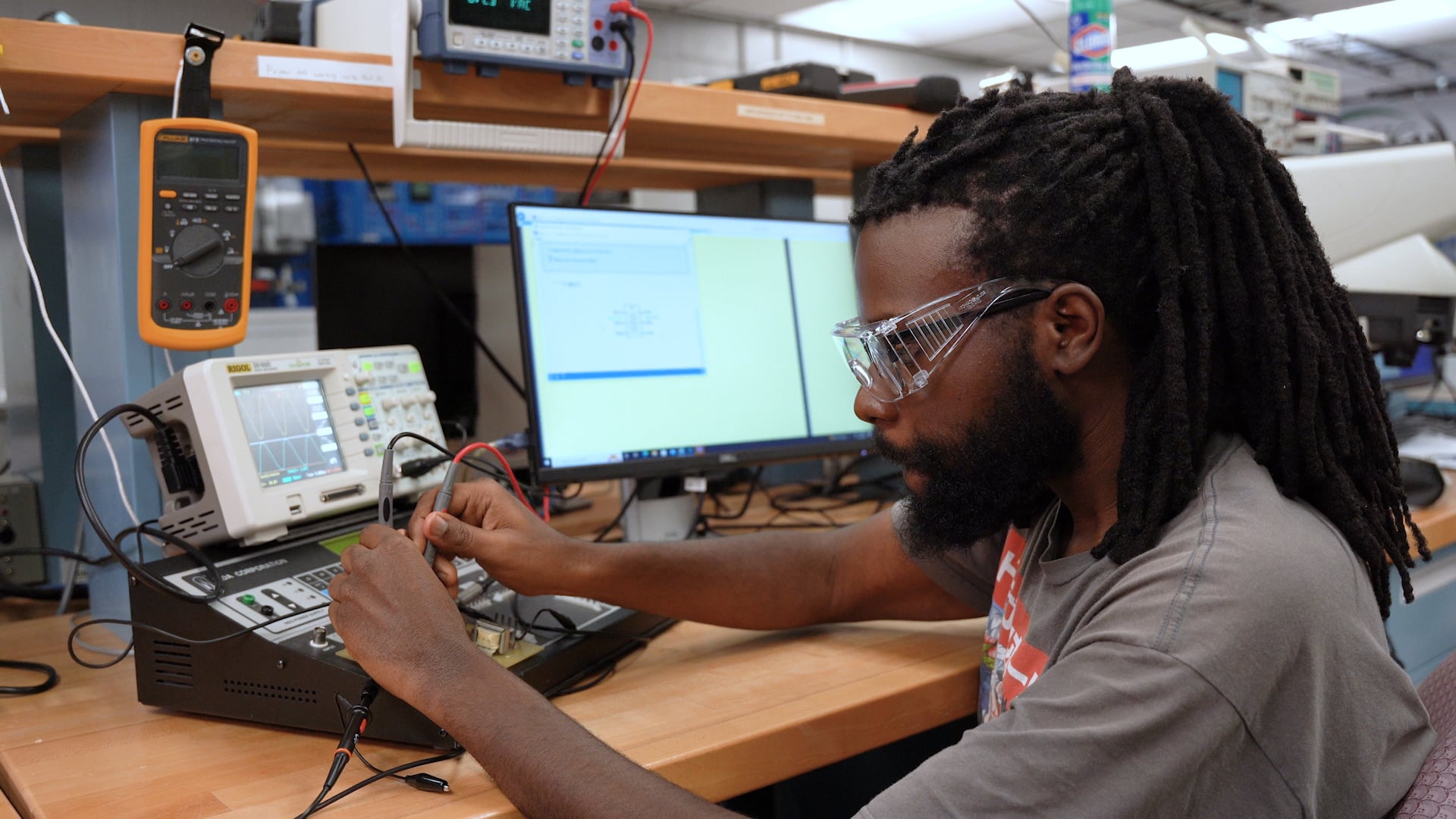
Electronics Fundamentals Diploma
Electronics Technology
Diploma
3 Semesters
The Electronics Fundamentals diploma program is designed to prepare students for careers in electronics professions. The program emphasizes a combination of electronics theory and practical application necessary for successful employment. Program graduates receive an Electronics Fundamentals diploma which prepares them for entry-level positions in the electronics field and qualifies them for admission to the Electronics Fundamentals program.
The HOPE Career Grant is available to HOPE Grant-qualified students who enroll in select majors specifically aligned with industries in which there are more jobs available in Georgia than there are skilled workers to fill them. Learn More
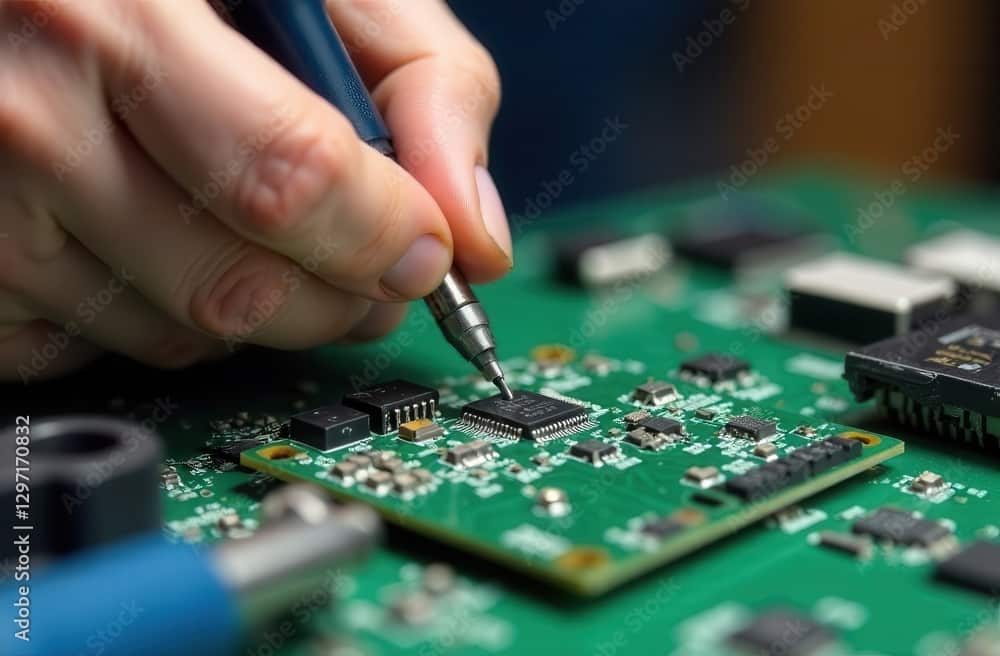
Electronics Technology Associate of Applied Science Degree
Electronics Technology
Associate of Applied Science Degree
5 Semesters
The Electronics Technology Associate of Applied Science Degree program is a sequence of courses designed to prepare students for careers in electronics professions. The program emphasizes a combination of electronics technology theory and practical application necessary for successful employment using both manual and computerized electronics systems. Program graduates receive an Electronics Technology Associate of Applied Science Degree, which qualifies them as electronics technicians with a specialization in communications electronics, or industrial electronics.
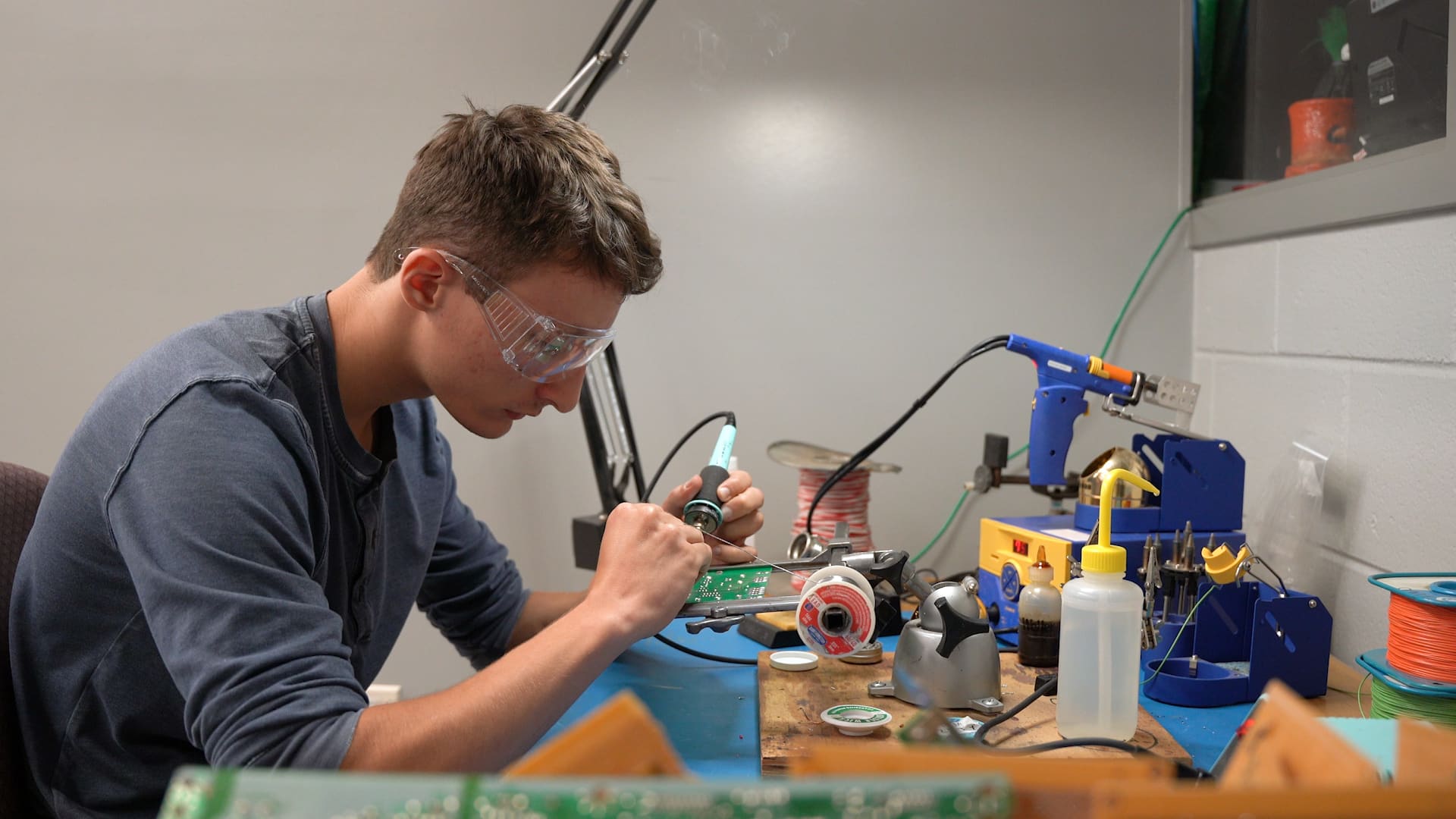
Electronics Technology Diploma
Electronics Technology
Diploma
4 Semesters
The Electronics Technology Diploma program is a sequence of courses designed to prepare students for careers in electronics technology professions. The program emphasizes a combination of electronics technology theory and practical application necessary for successful employment using both manual and computerized electronics systems. Program graduates receive an Electronics Technology Diploma which qualifies them as electronics technicians with a specialization in biomedical instrumentation, communications electronics, or industrial electronics.
The HOPE Career Grant is available to HOPE Grant-qualified students who enroll in select majors specifically aligned with industries in which there are more jobs available in Georgia than there are skilled workers to fill them. Learn More
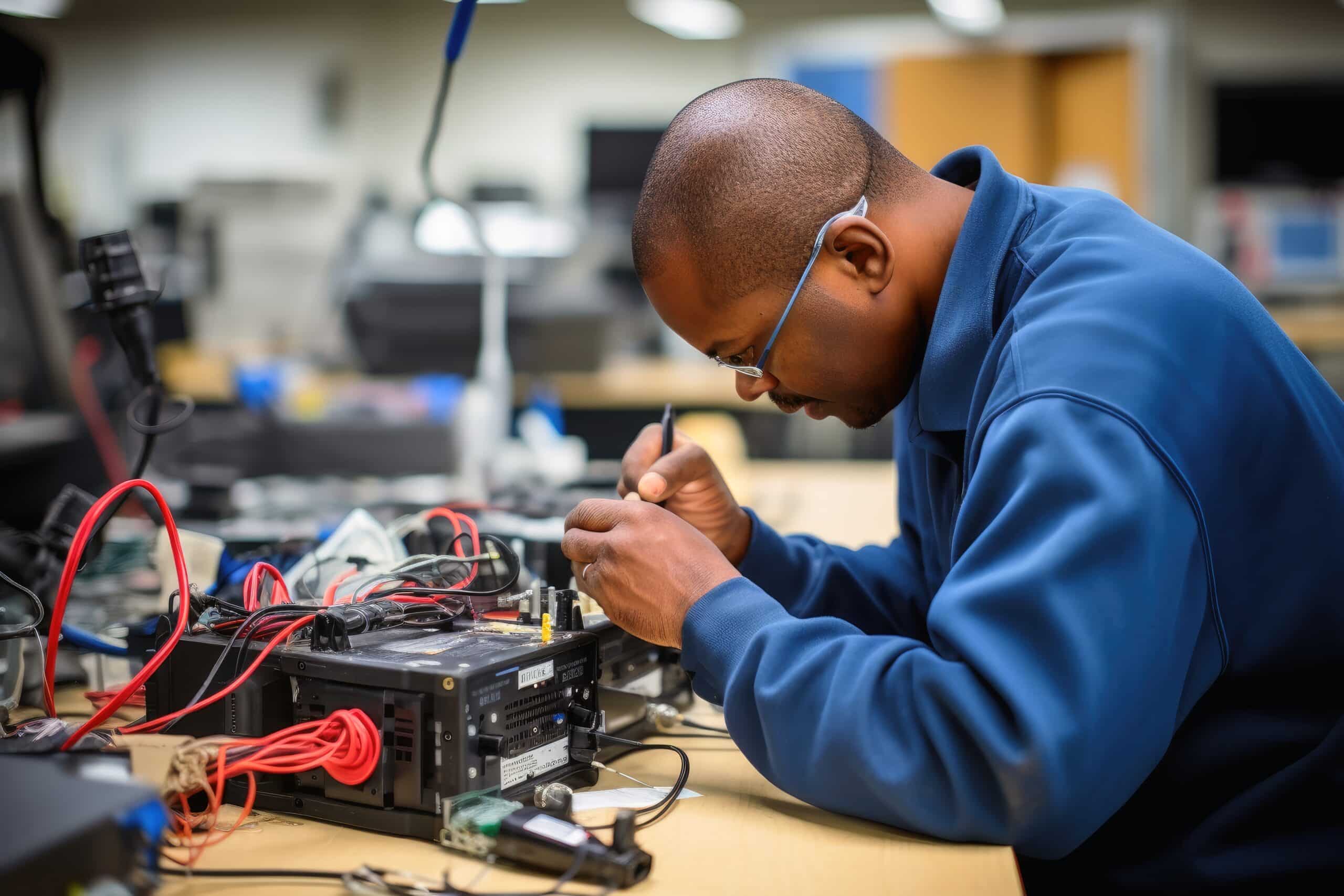
Interdisciplinary Studies – Electronics Fundamentals Associate of Applied Science Degree
Electronics Technology
Associate of Applied Science Degree
5 Semesters
The Associates of Applied Science Degree in Interdisciplinary Studies – Electronics Fundamentals program is designed to prepare students for careers in electronics professions. The program emphasizes a combination of electronics theory and practical application necessary for successful employment. Program graduates receive an Interdisciplinary Studies – Electronics Fundamentals degree which prepares them for entry-level positions in the electronics field and qualifies them for admission to the Electronics Technology program
Features
Job Stability & Security
There is a consistent need for Electronics Technicians to perform component level troubleshooting for maintenance and repair of complex electrical or computer systems.
The Bureau of Labor and Statistics notes that this is a steady field and that graduates in these areas are well-equipped to secure employment in entry-level positions.
Little or No Cost to You
With the Pell Grant, Georgia’s HOPE Grant, HOPE Scholarship, and HOPE Career Grant (for students/programs who qualify) and other scholarship opportunities, many students graduate OFTC with little to no debt.
Tuition & Fees
With tuition at $107 per credit hour, total costs for Electronics Technology department programs range from:
- Tuition & Fees*: $1,331.00 – $7,755.00
- Books & Supplies*: $1,965.00
*Visit the OFTC Catalog to view each individual program and its full breakdown of tuition, fees, books, and supplies. Costs are estimated and are subject to change.
Advancement Opportunities
An electronics technician is a stable and interesting career that offers many opportunities for advancement and growth with specialized training and knowledge.
Experienced professionals are retiring, and those jobs will need to be filled by the next wave of educated graduates. Now is a great time to consider pursuing a credential that can point you in the right direction.
Locations
Oconee Fall Line Technical College has campuses throughout its 11-county service area. We look forward to your visit.
Online
Admissions
Our application process takes just a few minutes to complete, but we want to make sure you have the things you’ll need on hand to complete the application. We’re here to help if you have any questions!
Admissions Process
Your admissions application can be submitted online with your $25.00 non-refundable application fee and takes just a few minutes to complete.
- Submit a completed application and application fee.
- Submit official high school transcript, GED transcript, or official college transcripts, if applicable.
- Submit official entrance score on a validated assessment instrument, if applicable. Visit the OFTC Catalog Program Page to view each individual program and its required minimum scores.
- Complete the FAFSA (Free Application for Federal Student Aid) and HOPE applications online using OFTC School Code: 031555.
NOTE: The College may accept transfer credit for other courses according to the College’s transfer policy.
General Requirements
Be at least 16 years of age.
Additional admissions requirements unique to each program are listed on each individual program page in the OFTC Catalog.
Need More Info?
For more information about any of these programs, contact a program advisor:
Dublin Program Advisor
For additional information on admission to OFTC, contact the Office of Admissions:
Sandersville Office of Admissions
Dublin Office of Admissions
Learning Format
Students can enter an Electronics Technology program any semester — because when you are ready to start on the path to a new career and change your life, there’s no reason to wait.
Classes are offered in a variety of formats: on campus, blended, online asynchronous, and synchronous technology.
On Campus
These are courses that are taught primarily in the classroom or lab with less than 50% of instruction online. On campus courses may include lecture, labs, internships, clinicals, and other in-person instructional modalities.
Blended
Blended courses are distance learning courses with the majority of the course content, activities, and interactions occurring online but may require students to come to campus for specific assignments, activities, or events.
Online Asynchronous
These are courses that are taught fully online asynchronously with course content, activities, and interactions occurring entirely online. This delivery method does not require students to be online at a specific date or time, and students may participate in class activities and complete course assignments asynchronously. Online asynchronous courses require proctored events.
Synchronous Technology
OFTC also utilizes synchronous technology to offer courses via distance education means. The course is taught on one campus and then broadcast simultaneously to a classroom on a different campus that is monitored by a class proctor.
Flexible Schedule
We want you to get the most out of college and understand the pressure it adds to your life. At OFTC you can achieve your career goals and fit college into your lifestyle. We offer small class sizes and flexible scheduling.
Courses for our programs are offered during the morning, afternoon, and evenings – plus many are online where you can do your work any time of day.
And the personalized hands-on attention you receive in a small classroom setting allows you to get individualized support, focus and feedback from your instructors. Your instructors will get to know you and help you build the foundation and confidence needed for success in your field.
Apply TodayPaying for College
At OFTC, we realize that many students require financial assistance to achieve their academic goals. We’ll work with you to help you obtain financial aid to assist you in funding your education. We’re committed to helping you find ways to pay for this life-changing investment.
With the Pell Grant, Georgia’s HOPE Grant, HOPE Scholarship, and HOPE Career Grant (for students/programs who qualify) and other scholarship opportunities, many students graduate OFTC with little to no debt.
Financial Aid
OFTC offers several financial aid opportunities that can help you pay for college. Most students apply for federal and state aid, including the Pell Grant, HOPE Scholarship & Grant, and HOPE Career Grant.
OFTC students can also apply for scholarships through the OFTC Foundation and various businesses and civic-sponsored organizations.
Contact the Office of Financial Aid or visit OFTC’s Financial Aid web page to learn more about grants, scholarships and Federal Work Study to help fund your education.
Sandersville
Dublin
Georgia awarded over $934 million in scholarships in AY24
of OFTC students have some form of Scholarship in AY24
OFTC students received over $6.6 million in financial assistance in FY25
More than 75% of OFTC students received some sort of Financial Aid in AY24
Contact
Sandersville
Dublin
Tuition & Fees
With tuition at $107 per credit hour, total costs for Electronics Technology department programs range from:
- Tuition & Fees*: $1,331.00 – $7,755.00
- Books & Supplies*: $1,965.00
*Visit the OFTC Catalog to view each individual program and its full breakdown of tuition, fees, books, and supplies. Costs are estimated and are subject to change.
New Price Calculator
You can also use the Net Price Calculator to get estimated net price information based on what similar students paid in a previous year.
Career Outlook
Electrical and electronics engineering technicians work alongside engineers to support the growing integration of computer and electronic systems in cars, portable devices, and household products.
BLS.GOV
Electrical and Electronic Engineering Installers and Repairers
- 2024 Median Annual Pay: $71,270
What does this mean to you?
With about 11,100 openings projected each year, opportunities are strong for skilled graduates. As experienced workers retire or change careers, you’ll be prepared to step into roles that keep industries moving forward.
Learn More
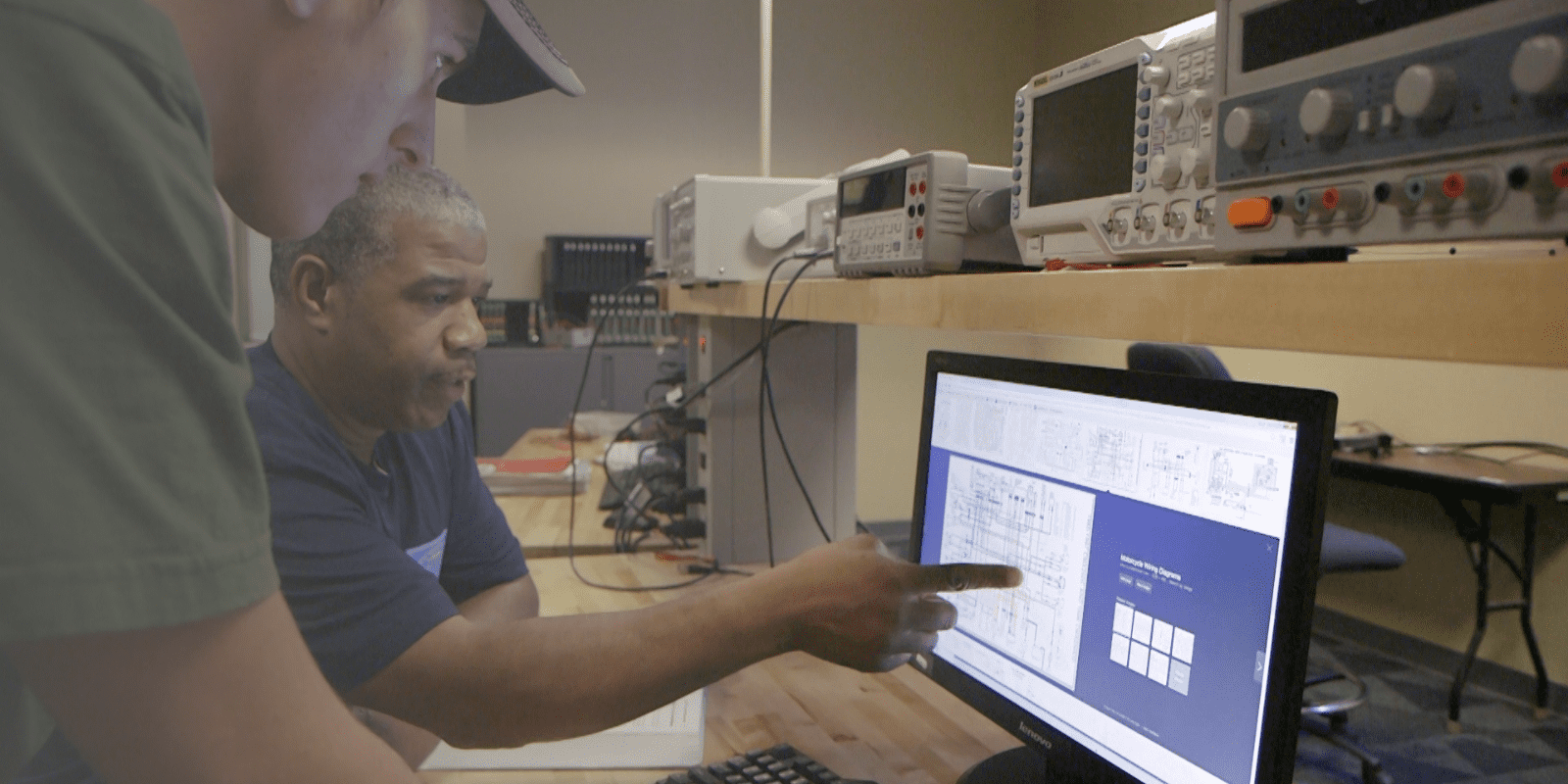
job placement rate for OFTC graduates within the graduation year (AY23)
in-field job placement rate for OFTC graduates within the graduation year (AY23)
of OFTC students enrolled are First Generation college students (AY24)
Program Benefits
Skills Learned
- Create basic circuitry and draft sketches to clarify details of design, under engineers’ direction
- Build prototypes from plans or sketches
- Assemble, test, and maintain circuitry or electronic components according to engineering instructions, knowledge of electronics, and technical manuals
- Adjust and replace defective circuitry and electronic components
- Make parts, such as coils and terminal boards, using bench lathes, drills, or other machine tools
Job Titles
- Electronics Technician
Diverse Settings
- Federal government
- Engineering services
- Semiconductor and other electronic component manufacturing
- Navigational, measuring, electromedical, and control instruments manufacturing
- Merchant wholesalers, durable goods
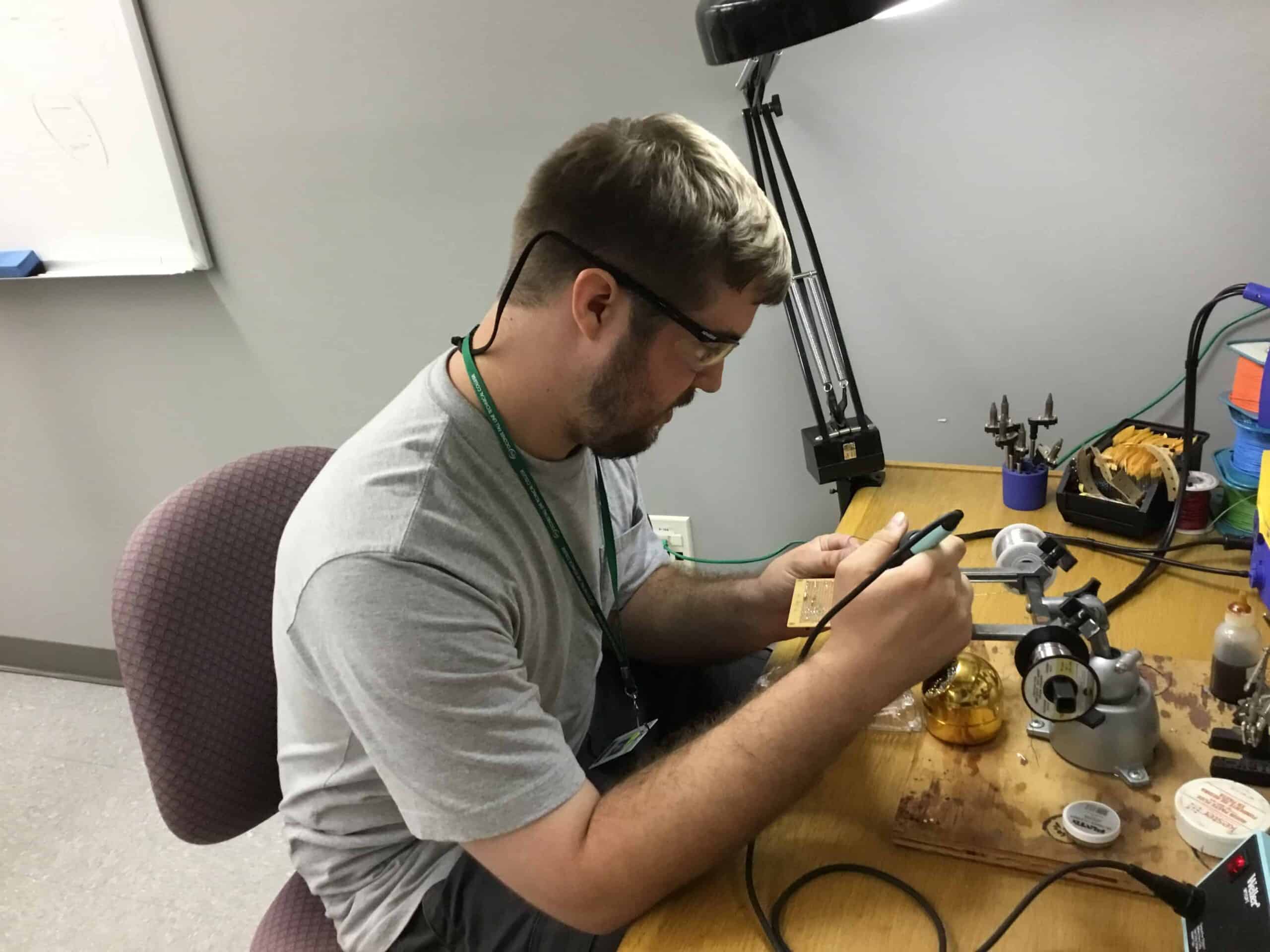
"OFTC’s Electronics program prepared me for my career at Robins Air Force Base as an electronics mechanic. The equipment utilized on campus parallels my experience in field and the instructors were always there to assist me in the learning process. OFTC gave me the knowledge and the hands-on experience I needed to launch my career."
